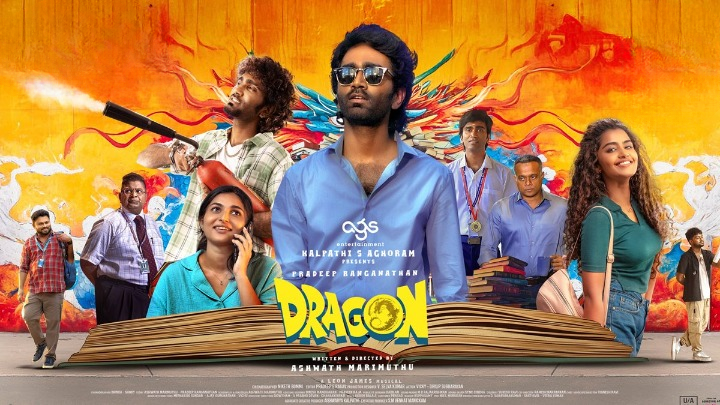Dragon: Opulence of Success

Star Cast: Pradeep Ranganathan, KS Ravi Kumar, Gautham Vasudev Menon, Mysskin, Vj Siddhu, Harshath Khan, Anupama Parameshwaran, Kayadu Lohar, & Mariam George.
Music Composed by Leon James
Cinematography by Niketh Bommi
Directed by Ashwath Marimuthu
I felt “Drag … Drag … Drag-on” is the best way to describe the second half of this film. When the beats are obvious, the film should run, but instead it tries to slow down, hence the feel. Still, it remains a film that, due to its aspirational quality, is still high. It survives the asteroid strike and marches on. There is an attempt to hit the highest hanging fruit in the script, but it barely scratches the low-hanging ones. Why?
Spoiler Alert – Dragon can spit fire..
In our society, success is defined by material wealth, not internal qualities. You want a perfume as costly as Clive Christian No. 1 Imperial Majesty on your dressing table, the Rolls-Royce Boat Tail in your garage, The Nightingale of Kuala Lumpur dress in your wardrobe, and a home like Buckingham Palace. You want to be so rich that you could change the President of the USA, and for fun, you want to buy a social media network and change it for your convenience. Now, go and search how expensive the listed things are. Isn’t that the success we are all taught about? Weren’t we all shamed for resorting to selling chana or bajji on the road? Actually, those street hawkers earn 2,000-5,000 per day, while our salaries are… Should I finish it?
When success is defined by cost and flair, you see the opulence but not the beauty of the hard work that makes you worthy of it. Director Ashwath Marimuthu has this idea, but it remains at the idea level only. The hero states it in the climax but never truly realizes the true meaning of success. Feeling guilty, accepting mistakes, and getting punished don’t lead to realization. Realization occurs when you understand that the success you enjoy is hollow. Committing a crime for success and understanding the true meaning of success are two different things. For example, Rajinikanth finding granite ore in Padayappa / Narasimha [1999] is a means of success, but naming the factory after the villagers and giving them equal shares, along with himself, is the understanding of success.
Also Read: Love Today: Dial-in-A Relationship
You may say, how can sharing be understanding? No confusion here, he did not simply share it, he recognized the efforts of everyone and their large heartedness in electing him as their leader. So, he is not aspiring to be the leader, but because they chose him, he became an ideal leader. Similarly, Amarendra Baahubali became a leader because he exhibited such qualities, not because his foster parents wanted him and his foster brother to race in a war for the throne. His success lies in saving his people, Bhallaladeva’s success lies in claiming the throne. If you show Bhallaladeva repenting after being on the throne for two years and giving it up to Devasena, will he be successful or a criminal? So, is Dragon about true success or the refinement of a criminal who got a second chance to rebuild himself?
Ashwath, in his penchant to make it about both, loses sight of truly showing what success can be. Pradeep Ranganathan earning his degree with honesty and then restarting his career with his friends to achieve “real success” would have been an ideal closure if the film was about it. Had it been about not taking shortcuts to success and going on a long road, then it should have been a parallel narrative about long hard earned success and short term success. By mixing up both, he tried to showcase how criminal it can be to snatch an opportunity from a “truly deserving person.” The intentions are great, but what about the efforts he did put in to seriously be worthy of the success that came with shortcuts?
Are those efforts dishonest? Are those 47 papers cleared at one go insincere? Are the sincere efforts he put in to establish a life for his parents wrong? Balancing the good and bad to showcase the understandable grey is important. With all the experience he gained as an employee, he could try to develop an app with his friends as leads and see that there is a bigger success for everyone. Why not societal growth rather than personal growth? I am not saying the hero should be ideal, but if that is what the director is going for, then why not this? Why not be the one that contributes to success rather than be the criminal? The true change should be aspirational, not a downgrade of efforts.
Overall, the movie works as Leon James, Pradeep Ranganathan, and to an extent, Anupama Parameswaran are effective. But Kayadu Lohar, VJ Siddhu, Harshath Khan, and even Mysskin have monotonous characters. A more realistic approach to showcasing a gray character as is and presenting “real success” needs to have been highlighted. Dragon ends up being an aspirational subject rather than a realist one. The opulence of catering to all sections of the audience made it a mere observation while it aspires to be a thesis. I’m glad for Pradeep as he seems to have found a voice for himself with a clear cut signature of his own.
Theatrical Trailer:
Recent Comments